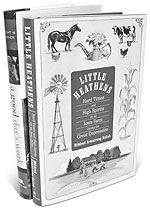
We Really Ought to Give Iowa a Try
By BILL KAUFFMAN, The Wall Street journalJuly 3, 2007; Page D5
Grant Wood, "The Music Man," Donna Reed: Has any state contributed so bounteously to American culture as Iowa? Well, maybe Mississippi, but if Iowans can't sing the blues, they sure can write about 'em. The 1930s -- simultaneously the age of the Great Depression and the heyday of Iowa regionalism -- is now the setting for two memoirs of Iowa farm life.

This is a lovely re-creation of an Iowa girlhood before the invasion of the electrified time-wasters and soul-deadening initialisms of TV, PC and IM. The author writes of "the kinship of souls that is created when everyone gathers in the kitchen to prepare a meal together." The "smell of bacon" lifts her to Proustian reverie. Ms. Kalish provides recipes (Aunt Belle's horehound candy & cough syrup, carrot marmalade, corn oysters) and folk remedies (wart removal, 1,001 uses for peroxide). She tells us how to skin a rabbit, boil a hog's head and fry a turtle. She is unsqueamish, the surest sign of a farm girl, and also wry, affectionate, forgiving: a delightful companion.
There are worse things, she knows, than not having things. Not having roots, for instance. Ms. Kalish was raised "in an environment where everyone knew everyone else." It endowed her with "a sense of security, a sense of belonging in the world." She knew who she was, where she was from. She could name the birds, the flowers, the animals. This is a knowledge that the children of her old town, who today are "bused to a megaschool," will not acquire in technology class.
In "A Good Day's Work," Dwight W. Hoover revisits the 1930s by describing his boyhood on a 100-acre Iowa family farm, "a capitalistic enterprise overlaid on a subsistence occupation." His family alternately resists and compromises with the "get big or get out" drift of 20th-century American agriculture.
What is most striking about Mr. Hoover's account is the extent to which the "progress" that drove his family off the land was the work not of some invisible hand but rather of government policy. Sometimes it was as brutally straightforward as the Iowa Highway Commission using its power of eminent domain to "construct a state highway through my father's farm," obliterating an apple and pear orchard.
At other times it was subtler. For example, the price of draft horses zoomed in World War I as horses were all but drafted for service in Europe. Tractors filled the gap. The costs of the mechanization required more cash crops, a looking outward, a de-emphasis on self-sufficiency. Farmers began to buy eggs and milk and meat from stores and tear down fences to allow "full utilization of the tractor's potential." With livestock gone, manure gave way to chemical fertilizers. Welcome to the modern age.
The Hoovers, living up to their surname, did not look to the New Deal for relief. Dwight's father and uncles, "good Republicans," refused to accept government credit. A farmer cousin with the echoic Quaker name of Herbert Hoover even went to prison for resisting the draft.
Dwight Hoover is unsentimental. His book lacks the warmth of Ms. Kalish's, though his observations are often acute: "Pumping water was no more boring than working out in a gym, and at least the exercise was outdoors in clean air." He does not cover his little schoolhouse in treacle: As is the case today in rural schools, the dull standardized textbooks of Hoover's youth disdained agriculture as a peasant pursuit beneath notice.
Dwight's grandfather urged the boy to farm the old way, with horses, and thus avoid the debt and overextension that would bleed postwar family farms. It might have worked. But the "social isolation" of the bachelor farmer spooked him. Dwight, a lousy cornhusker and bright boy, left the farm, and Iowa, for academe. He has thought on what was and wondered what might have been. He is not without regret.
The most poignant scene in the book is his 50th high-school reunion, at which he is unrecognized by classmates and Iowa is unrecognizable to him. The old homestead is for sale. A floodlight company is located across the road, its wares aglow, blotting out the marvelously dark Iowa nights. The tone here is elegiac. The "Iowa boy," writes Mr. Hoover, "is history."
Might the coincident release of these books augur an Iowa renaissance? Alas, the authors have long fled their fecund native soil for Florida (Hoover) and California (Kalish). But Iowans are imaginatively literate sorts. As such restorative movements as community-supported agriculture and human-scale organic farming flourish, the values that Mildred Kalish associates with her upbringing -- "resourcefulness, dedication, hard work, discipline, creativity, and goodwill" -- will find defenders, even memoirists, in tomorrow's Iowa.
Mr. Kauffman's most recent books are Dispatches From the Muckdog Gazette (Holt) and Look Homeward, America (ISI).